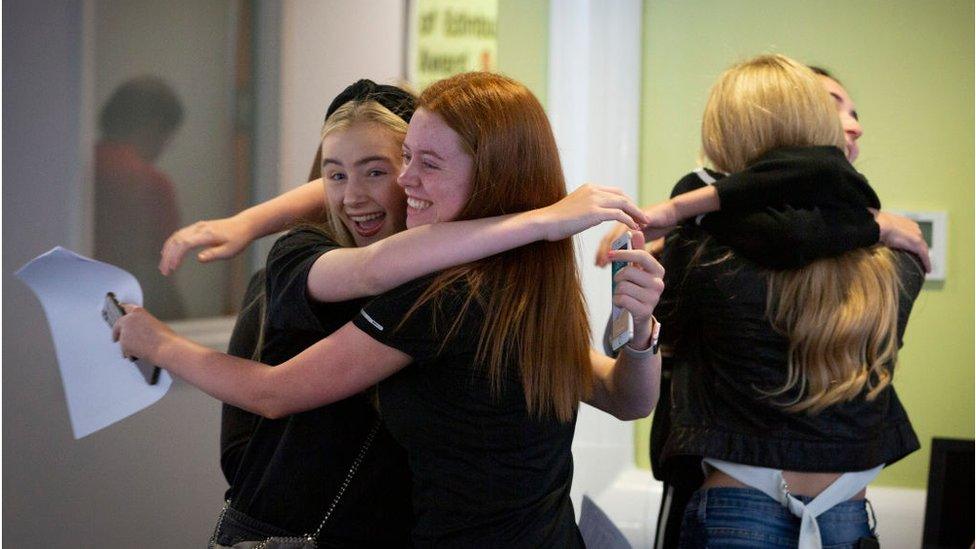Colleges need extra £570m due to rise in students - think tank
- Published
- comments

Record numbers of GCSE passes mean extra pressure on sixth forms
Colleges and sixth forms in England need an extra £570m to keep pace with the rising number of students, says the Institute for Fiscal Studies (IFS).
The rise in numbers of older teenagers, and higher GCSE grades, is set to push up college numbers.
The IFS says funding for 16-to-18 learning fell in real terms by 11% in colleges and 25% in schools since 2010.
The government says it has announced an extra £291m for 2021-22 in addition to a £400m increase in the previous year.
'Plethora of challenges'
The IFS research says further education colleges and sixth forms in England have seen the largest falls in funding in the education sector over the past decade.
Imran Tahir, research economist and co-author, said: "These institutions now also face a plethora of additional challenges created by fast rises in student numbers and the need to help pupils catch up on lost learning."
The government gave the sector an extra £400m in 2020-21, a sum it described as "the single biggest annual uplift since 2010".
But the IFS says with student numbers growing by 5% in 2020 alone, this restores funding back to 2018-19 levels, at best.
The IFS calculates that an extra £570m will be needed in the 2022-23 academic year, just to keep funding per student at the level it was the previous year.
'Abnormally' high results
Colleges and sixth forms will need even more money if they are to respond to the major long-term challenges they face, it says.
These include helping students catch up on months of learning lost during the pandemic, and a projected rise in the number of 16 and 17-year-olds of 17% or 200,000 in England between 2019 and 2024.
The researchers point out that the rate of 16 and 17-year-olds in full-time education had already risen to an historical high of 85% in 2020.
This includes especially large rises in 2020 due to "abnormally" high GCSE results and reduced opportunities outside education during the pandemic, they say.
Given that GCSE results were higher again in 2021, the researchers suggest there is likely to be a further jump in students.
At the same time, the number of 16 and 17-year-olds doing apprenticeships fell to an all-time low of 3% in 2020 - with a 30% fall in numbers in 2020 alone. This reflects both the effects of the pandemic and a gradual reduction in take-up over the long term, according to the research.
The chief executive of the Association of Colleges, David Hughes, said: "There is an urgent need for the Department for Education to guarantee full funding for every student recruited by schools and colleges this autumn, much the same way they do for universities as well as seek a commitment in the Spending Review to a longer-term revenue and capital budget that anticipates demographic trends."
A Department for Education spokesman said:"Further education is playing a vital role in delivering the skills young people need to get ahead. So we can meet the needs of all 16-19-year-olds we've announced an extra £291m for 2021-22, in addition to the £400m increase in 2020-21.
"Funding for future years beyond 2021-22, including anticipated increases in the 16-19 population will be considered as part of the upcoming Spending Review."